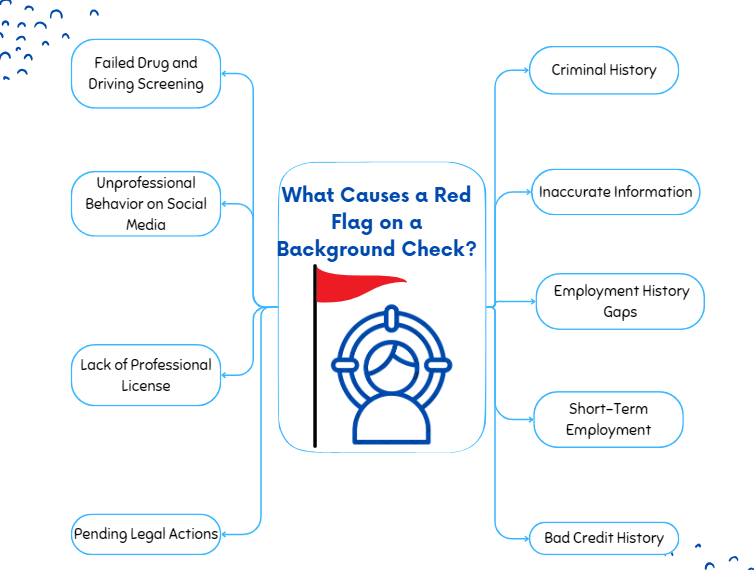What Causes a Red Flag on a Background Check?
.webp)
Conducting a background check with AI is essential for employers looking to make informed hiring decisions.
However, there can be problems when performing background checks for employment, such as the problem with background checks for employment.. One major concern is the emergence of red flags during the screening process.
A red flag in a background check is anything alarming or concerning about a person's past. This could be a history of breaking the law, lying about work experience or education, or other serious issues.
Background checks are an integral part of modern pre and post phases of hiring processes, yet they often spark anxiety for both employers and job seekers. Employers worry about hiring risks—like dishonest applications or hidden criminal records—while candidates fear past mistakes or incomplete records might jeopardize their chances. These concerns underscore the need for transparency and fairness in background checks.
This guide will walk you through what a background check entails, common red flags to watch for, and actionable steps to address potential issues. Whether you're an employer seeking reliable insights or a job seeker aiming to present your best self, understanding this process is key to a smooth hiring experience.
Understanding what causes these red flags is crucial for both employers and candidates alike.
What is a Background Check?
A background check is a way for employers or organizations to look into a person's past. This process helps them confirm important details, such as the individual's identity, criminal history, education, work experience, and other relevant information.
The goal is to make sure the person is a good fit for the job they're applying for. Essentially, it’s about ensuring that employers have the right information to make informed hiring decisions.
Types of Background Check
There are several types of background checks that employers might conduct, including:
- Criminal Background Check: For any criminal records.
- Employment History Verification: Past job roles and durations.
- Education Verification: Academic credentials.
- Credit History Check: Individual's financial background.
- Social Media Screening: Social media activity for any concerning behavior.
For more detailed information, refer to Screening Potential Employees.
What Causes a Red Flag on a Background Check?

Some of the most common types of red flags include: the presence of one or more minor crimes criminal records.
1. Criminal History
Having a criminal record is one of the most significant red flags. This can range from minor and major crimes, depending on the seriousness of the crime. Employers often view this as a potential risk, especially in jobs involving sensitive information or exposed populations.
2. Inaccurate Information for Education and Previous Experience
Providing false information regarding education and previous job roles is a serious red flag. Employers may check academic records and previous employers to confirm the accuracy of the information. Differences can lead to a lack of credibility.
3. Gaps in Employment History
The Privacy Act of 1974 establishes rules for collecting, preserving, using, and spreading personal information by all federal agencies. Long gaps in employment history can raise suspicions for employers. They may question why a candidate was not employed during that time and what they were doing.
4. Short-Term Employment
Changing jobs often or having short times in different jobs can show that a person might not be committed or may have trouble fitting in at work. Employers usually like to see candidates with a steady job history.
5. Bad Credit History
Having a bad credit history can be a big worry, Mainly for jobs that involve handling money. It might mean the person has trouble managing their money or other related issues.
6. Failed Drug and Driving Screening
Failed drug tests or driving screenings can cause a red flag. Employers want to ensure that their employees can perform their duties safely and responsibly. A failed drug test can signal potential substance abuse issues, while failed driving tests may show unsafe behavior.
7. Unprofessional Behavior on Social Media and Online Presence
How candidates show themselves on social media can also create concerns. Posts that are not suitable, hurtful comments, or any unprofessional actions online can affect hiring choices. Employers usually check candidates' online profiles to assess their character. Social Media Screening helps identify red flags, such as discriminatory behavior, substance abuse references, or violations of workplace policies, enabling employers to make informed decisions.
Read also: 8 Benefits of Social Media Screening
8. Lack of Professional License and Certificate
For certain positions, especially in regulated industries like healthcare, lacking the necessary professional license or certifications can raise concerns. Employers expect candidates to have the qualifications required to perform their job effectively.
9. Pending Legal Actions or Civil Lawsuits
Pending legal issues or civil lawsuits can cause concern for employers. They may be worried about how hiring someone involved in ongoing legal matters could affect their business.
How to Address These Red Flags in Background Check?
While background checks help employers make informed decisions, they may uncover red flags that could potentially raise concerns. These red flags could be a criminal record, inaccurate information, gaps in employment, or unprofessional behavior on social media, among other things. Here's how to address the most common red flags that may come up in a background check.
Criminal History
Inaccurate Information for Education and Previous Experience
Gaps in Employment History
Short-Term Employment
Bad Credit History
Failed Drug and Driving Screening
Unprofessional Behavior on Social Media and Online Presence
Lack of Professional License and Certificate
Pending Legal Actions or Civil Lawsuits
Why Conducting Background Checks is Important for Employers
95% of employers with at least one US location conduct one or more types of employee background checks. Understanding potential risks Linkedwith a candidate helps employers make informed decisions and protect their organization.
Hiring the right candidate is one of the most important decisions an employer can make, as it directly impacts the company’s culture, productivity, and reputation. However, making an informed hiring decision can be challenging without a comprehensive understanding of a candidate’s past. This is where background checks play a crucial role. By conducting thorough screenings, employers can uncover key information about a candidate’s criminal history, employment record, educational background, and even social media presence, ensuring they make the best choice for their organization. With 95% of employers in the U.S. using background checks to assess potential hires, this process has become a critical step in safeguarding businesses from hiring risks and ensuring a safer and more qualified workforce.
For more information on this statistic, refer to 95% of employers statistics.
Addressing Red Flags For Employers
If you see red flags, you should:
- Look at the Situation: Understand what caused the red flag.
- Ask More Questions: A follow-up interview can clear up worries.
- Check for Patterns: See if there’s a history of similar behavior.
- Know the Laws: Learn about laws on rehabilitation.
- Follow the Rules: Make sure your checks meet legal requirements.
- Write Everything Down: Keep records of what you find and what you do.
Addressing Red Flags For Candidates
If you have red flags, you can:
- Be Honest: Being open helps build trust with employers.
- Prepare Your Answers: Have simple reasons for your red flags.
- Show Your Strengths: Highlight what makes you a good candidate.
- Give References: References can help prove your character.
- Get Your Background Check: Check for mistakes and correct them.
- Show Growth: Explain how you've learned from past mistakes.
Legal Considerations For Dealing with Red Flags in Background Checks
- Fair Credit Reporting Act (FCRA): The FCRA regulates how background checks should be conducted, ensuring that candidates are treated fairly.
- Equal Employment Opportunity Commission (EEOC): The EEOC provides guidelines to prevent discrimination during the hiring process, in line with anti-discrimination laws.
- State and Local Laws: Federal laws apply to everyone in the United States. State and local laws apply to people who live or work in a particular state, commonwealth, territory, county, city, municipality, town, township, or village. Employers must adhere to these laws to avoid legal repercussions.
- Rehabilitation Laws: These laws can protect individuals with past convictions from being unfairly treated during hiring.
- Data Privacy Laws: Employers must also consider data privacy laws when conducting background checks to protect candidates' personal information.
- Americans with Disabilities Act (ADA): This act ensures that individuals with disabilities are not discriminated against in the hiring process, further emphasizing the need for fair treatment of all candidates.
How Ferretly will Help in Navigating Background Checks and Addressing Red Flags?
Ferretly specializes in providing background checks with AI, helping organizations streamline their screening processes. The platform uses advanced technology to analyze data more accurately and efficiently, making the hiring process smoother for both employers and candidates.
Background Check Red Flags - Questions
1. What is a red flag on a background check?
A red flag in a background check is anything that raises concern about someone's past. This can include a record of criminal activity, dishonesty about work experience or education, or other serious problems.
2. Will a job tell you if you failed a background check?
Usually, employers are not obligated to tell candidates if they fail a background check. However, they may share the reasons for not hiring someone based on the results.
3. How Long Does a Background Check Take?
If there are delays due to incomplete or inaccurate information, the process may take longer. A background check can take anywhere from a few days to a couple of weeks.
4. Is it legal to do a background check on someone?
Ethically—and often legally—you should always obtain permission from the individual before conducting a background check.
Conclusion
Understanding the potential red flags that may arise during a background check is essential for both employers and candidates.
By addressing these concerns proactively, individuals can improve their chances of success in the hiring process while employers can make informed decisions that safeguard their organizations.
For further inquiries regarding background checks, consider reaching out to Ferretly for assistance in navigating the complexities of employee screening.






